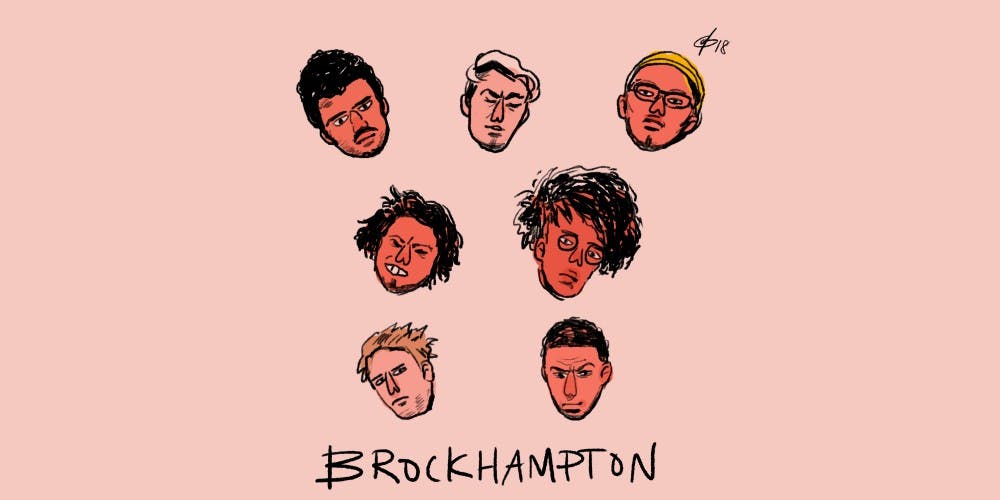This week, much loved rap collective BROCKHAMPTON, the self–proclaimed “biggest boyband in the world” signed a record deal with RCA. They announced it with a video entitled “LET’S GET MARRIED” and enlisted a poe–faced Jaden Smith as their mascot. At the end of the video they teased us with a gorgeous piano loop from their upcoming album PUPPY—modern and nostalgic at the same time. Less than a minute long, it left me wanting much more and made it blatantly apparent that I was sucked into the BROCKHAMPTON publicity machine. While the teaser track for PUPPY was a delight for most, many fans have taken to Twitter to express their grievance at their signing to RCA. This has inevitably cued much wailing and gnashing of teeth accompanied with declarations such as “its over” and “it’ll never be the same.” But what does signing with a major record label actually mean in 2018?
Perhaps the two best examples of mainstream rap artists who have forgone major record etiquette to great success are Chance the Rapper and Frank Ocean, both in 2016, with Coloring Book and Blonde, respectively. Coloring Book became the only non–major record label release to win a Grammy and managed to dominate the charts through streaming stats alone. The fact that it dropped around the time that Kanye’s The Life of Pablo was released, an album that Chance is all over, both on writing credits and features, helped hugely with the success of the album. It cemented Chance’s status in the mainstream and the album sounded just like a record label release, chock–full celebrity features, ranging from Future and Kanye to Francis and the Lights and the Chicago Children’s Choir and highly professional, studio–level production. It seemed like it was a major record release in everything but name. To this end, Chance made it an integral piece of his marketing that he was unsigned, even incorporating it into his lyrics, most notably on the smash hit “No Problem.” If it wasn’t clear that Chance was unsigned before this album, we all knew about it by the middle of 2016. He took every publicity opportunity he had to broadcast that he was doing everything on his own and that people should follow his example and not compromise their artistic integrity by signing for a major label. The industry ate it up and he has been cemented as somewhat of a DIY hero owing the SoundCloud and DatPiff communities props for his come–up.
An interesting question to ask however, was when exactly he adopted his independent approach, as there is hardly any mention of his lack–of–label on his 2013 Acid Rap mixtape. A particularly cynical opinion is that Chance would have signed for a major label had his 2013 mixtape blown up; instead he accrued a cult following on SoundCloud and garnered a lot of attention for his live shows. Surf released in 2015 under the moniker ‘Donnie Trumpet and the Social Experiment’ simply capitalized on the success of the Acid Rap tour and both albums blew up in the middle of 2015. By this time it seems that he had figured out a way in which he could still tour with his cult following, make music and finance his own musical endeavors, all without signing a record deal. Regardless of how cynical a move it was, it went extremely well for him and he has firmly established himself in the mainstream.
Blonde by Frank Ocean, also released in 2016, was released under Frank own’s label Boy’s Don’t Cry. He actually had major label support in the form of resources and studio time due to his contract with Def Jam. However, in what is now a relatively famous story, he created the visual, almost unsellable album Endless, in order to fulfill his Def Jam contract and released Blonde, to universal acclaim under his own label a day later. At the culmination of what he has since called a “seven year chess game,” Frank Ocean managed to evade his Def Jam contract and he was free from industry ennui, fully in control of his own music. Again, its working for him and, perhaps in a contrasting way to Chance the Rapper, Ocean has also cemented his status as someone who values his musical integrity over record–label recognition. This seems a much less active publicity move than Chance’s constant self–proclaiming, but releasing nothing or only giving tiny snippets of information has always been Frank’s go–to marketing method. Hard to get works in his favor and he seems to know that.
So... what does signing for RCA mean? In short, I'm not sure it means that much. ASAP Ferg was interviewed last year on this very topic and his view seemed to be that signing for a record label was convenient in terms of connections and essentially allowed artists to gain an earlier paycheck—clearly a smart move for BROCKHAMPTON, who have an almost unprecedented amount of personnel involved. ODD FUTURE's deal with SONY in 2011, perhaps the most comparable deal, had mainly to do with touring and their need for more mainstream exposure. As we now know, it didn't affect the quality of their music and an overwhelming majority of die–hard fans were eventually satisfied with the group's output following the deal. Additionally, RCA aren't a particularly controlling or charismatic label in the manner of Kendrick Lamar's TDE; they even have cosigns with artists such as SZA simply for promotional purposes. I think that despite the fact that part of BROCKHAMPTON's charm is their DIY approach, this major record label signing won't do much other than increase the chances of seeing BROCKHAMPTON at larger festivals and simply touring more, perhaps even in your hometown.







